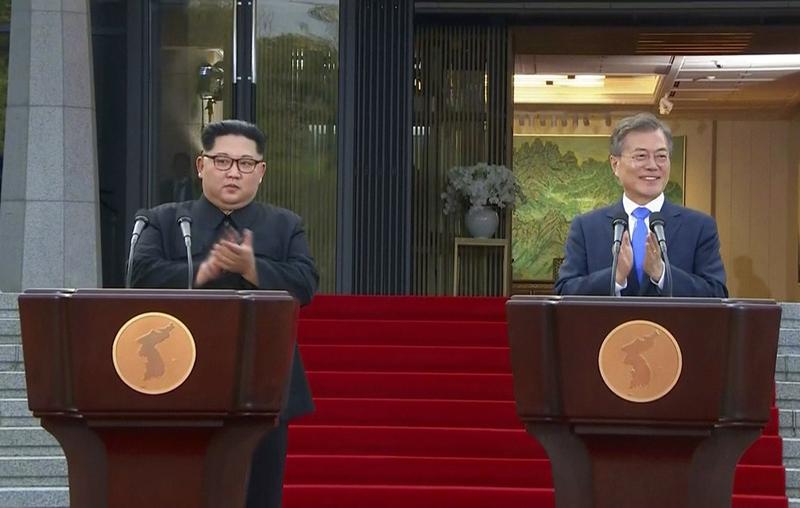
(Photo: China Daily)
China welcomes the consensus reached by North Korea and South Korea for ending military tensions and realizing denuclearization on the Korean Peninsula, and analysts said now the ball is in the US court for a crucial next step to promote denuclearization process on the peninsula.
As a neighbor, China always support North Korea and South Korea to improve their relations and promote reconciliation via dialogues and negotiations, and it expects the two Koreas to continue efforts to promote long-term peace and stability in the region, Foreign Ministry spokesperson Geng Shuang said at a routine daily press conference on Wednesday.
North Korean leader Kim Jong-un and South Korean President Moon Jae-in made the pledge at a joint press conference on Wednesday, following the second round of talks during Moon's three-day visit to Pyongyang.
At the press conference, Kim said he wished to make the peninsula nuclear-free.
Moon said he and Kim have agreed on ways to denuclearize the Korean Peninsula for the first time. In addition, they agreed to end military tensions and transform the inter-Korean border into a "peace zone." The results are encouraging and deserve a positive response from the international society, especially as the summit was held in the backdrop of an impasse in the denuclearization negotiations, Zheng Jiyong, director of the Center for Korean Studies of Fudan University in Shanghai, told the Global Times on Wednesday.
In the joint declaration signed by Moon and Kim in Pyongyang, North Korea expressed its willingness to take additional steps, such as the permanent destruction of its main Yongbyon nuclear facility, if the US takes corresponding measures in accordance with the spirit of the North Korea-US summit agreement reached on June 12 in Singapore.
Zheng hailed Pyongyang's adherence to denuclearization as a highlight of the inter-Korean summit, noting that now the ball is in the US court.
Great impetus
Before meeting the press, Kim and Moon signed a summit agreement. Defense chiefs from both Koreas also signed a separate agreement on military affairs in the presence of the two top leaders.
Kim promised to accelerate the inter-Korean peace talks, further develop inter-Korean relations and visit Seoul, capital of South Korea, in the near future, the Xinhua News Agency reported.
Moon noted that they reached consensus to eliminate all threats of war on the entire Korean Peninsula. The consensus reached during the inter-Korean summit this time has the equivalent effect of a declaration that ends the Korean War (1950-53) as it would help prevent any military tension and conflict from the two Koreas, Lee Seong-hyon, director of the Center for Chinese Studies at the Sejong Institute in South Korea, told the Global Times on Wednesday. "The summit would serve as a great impetus for the denuclearization process on the peninsula," said Zheng. "The meetings are also a guarantee that the peninsula would not stand at the verge of breaking out and instead, the situation would remain stable."
The summit further consolidates the positive momentum gained from the previous summits between leaders from North Korea, South Korea, the US and China. It ensures that peace and stability would become a mainstream trend on the Korean Peninsula, said analysts.
More importantly, the best result that can come from this summit isn't who gave what concession but that talks such as these become the new normal, as hinted at in Moon and Kim's comments, Harry Kazianis, director of defense studies at the Washington-based Centre for the National Interest, told the Global Times on Wednesday.
Frequent communication is the only path to ensure that when Washington or Seoul has differences of opinion with Pyongyang, the situation would never go back to the days of "fire and fury," he noted.


